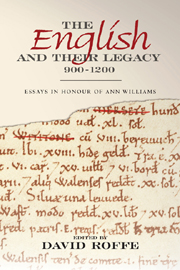Book contents
- Frontmatter
- Contents
- Figures and Tables
- Dedication
- Preface
- Contributors
- Abbreviations
- Ann Williams: a Personal Appreciation
- Life-writing and the Anglo-Saxons
- Meet the Swarts: Tracing a Thegnly Family in Late Anglo-Saxon England
- The Moneyers of Kent in the Long Eleventh Century
- Master Wace: a cross-Channel Prosopographer for the Twelfth Century?
- From Minster to Manor: the Early History of Bredon
- Eadulfingtun, Edmonton, and their Contexts
- The Family of Wulfric Spott: an Anglo-Saxon Mercian Marcher Dynasty?
- The Burial of King Æthelred the Unready at St Paul's
- Eustace II of Boulogne, the Crises of 1051–2 and the English Coinage
- Through the Eye of the Needle: Stigand, the Bayeux Tapestry and the Beginnings of the Historia Anglorum
- Robert of Torigni and the Historia Anglorum
- Invoking Earl Waltheof
- Hidden Lives: English Lords in post-Conquest Lincolnshire and Beyond
- Lordship and Lunching: Interpretations of Eating and Food in the Anglo-Norman World, 1050–1200, with Reference to the Bayeux Tapestry
- The Exchequer Cloth, c. 1176–1832: the Calculator, the Game of Chess, and the Process of Photozincography
- Ann Williams: a Bibliography 1969–2011
- Index
- Tabula Gratuloria
Robert of Torigni and the Historia Anglorum
Published online by Cambridge University Press: 05 April 2013
- Frontmatter
- Contents
- Figures and Tables
- Dedication
- Preface
- Contributors
- Abbreviations
- Ann Williams: a Personal Appreciation
- Life-writing and the Anglo-Saxons
- Meet the Swarts: Tracing a Thegnly Family in Late Anglo-Saxon England
- The Moneyers of Kent in the Long Eleventh Century
- Master Wace: a cross-Channel Prosopographer for the Twelfth Century?
- From Minster to Manor: the Early History of Bredon
- Eadulfingtun, Edmonton, and their Contexts
- The Family of Wulfric Spott: an Anglo-Saxon Mercian Marcher Dynasty?
- The Burial of King Æthelred the Unready at St Paul's
- Eustace II of Boulogne, the Crises of 1051–2 and the English Coinage
- Through the Eye of the Needle: Stigand, the Bayeux Tapestry and the Beginnings of the Historia Anglorum
- Robert of Torigni and the Historia Anglorum
- Invoking Earl Waltheof
- Hidden Lives: English Lords in post-Conquest Lincolnshire and Beyond
- Lordship and Lunching: Interpretations of Eating and Food in the Anglo-Norman World, 1050–1200, with Reference to the Bayeux Tapestry
- The Exchequer Cloth, c. 1176–1832: the Calculator, the Game of Chess, and the Process of Photozincography
- Ann Williams: a Bibliography 1969–2011
- Index
- Tabula Gratuloria
Summary
Robert of Torigni, author of additions to the Gesta Normannorum Ducum and of a chronicle that he pronounced to be a continuation of the universal chronicle of Sigebert of Gembloux, as well as of other less ambitious works, has never attracted the attention bestowed on the likes of Orderic Vitalis, William of Malmesbury and Henry of Huntingdon. This neglect is undoubtedly explicable by his having neither the originality of Orderic nor the depth and polish of Malmesbury and Huntingdon; the briefest of acquaintances with his writings rapidly reveals both his pedestrian prose style and limited range of interests. A notable verdict, although also a debateable one, is the late Margaret Gibson's that he was ‘an intelligent man without a trace of romance in his soul’. These well known limitations notwithstanding, there are in fact overwhelmingly strong reasons to include his contribution to the Historia Anglorum as an aspect of the process of how, in the words of Ann Williams, twelfthcentury historians ‘helped to weld English and Normans into a new English nation’. He was after all the only historian of Norman birth who lived almost his entire life in the duchy to set out explicitly to write the history of the English.
Robert was born at Torigni-sur-Vire in western Normandy at an unknown date, became a monk at Le Bec from 1128, was appointed prior there from c. 1149, and became abbot of Le Mont Saint-Michel, where he demonstrated exceptional administrative abilities, from 27 May 1154 until his death on 24 June 1186.
- Type
- Chapter
- Information
- The English and their Legacy, 900–1200Essays in Honour of Ann Williams, pp. 175 - 184Publisher: Boydell & BrewerPrint publication year: 2012

